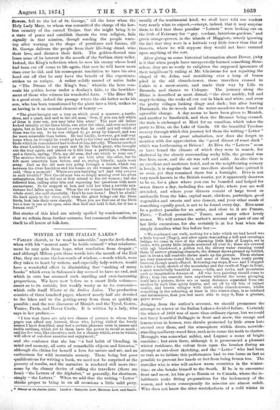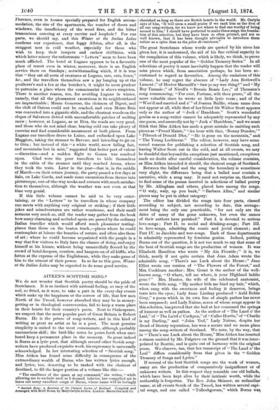WINTER AT THE ITALIAN LAKES.*
46 FALIEN cherub, to be weak is miserable," says the Arch-fiend, when with his "nearest mate " he holds council " what reinforce- ment he may gain from hope, what resolution from despair ; " and although Milton puts these words into the mouth of the Evil One, they are none the less words of wisdom,—words which, were they taken to heart by writers, and especially lady-writers, would have a wonderful effect in diminishing that "making of many books" which even in Solomon's day seemed to have no end, and which in ours has assumed such startling and ever-increasing proportions. We have now before us a smart little volume— smart as to its outside, but weakly washy as to its contents- -which calls itself Winter at the Italian Lakes. The production consists of three hundred pages, whereof nearly half are devoted to the lakes and to the getting-away from them as quickly as possible ; and the rest discourse of Munich and the Tyrol, Genoa, Venice, Pavia, and Dover Castle. It is written by a lady, who says in her preface,— "I fear that there are only two classes of persons to whom these pages can afford any interest, those who, having visited the lovely scenes I have described, may feel a certain pleasure even in names and feeble outlines, which yet to them have the power to recall so much ; and the few who, like ourselves, seek for a climate which, even in winter, will allow of out-door exercise and enjoyment ;" and she confesses that she has " a bad habit of blending, in mind and memory, all sorts of remarkable objects and histories," although she claims for herself a love for nature and art, and an enthusiasm for wild mountain scenery. These being but poor qualifications for writing a book, we need not be surprised at the poverty of results, and the narrative is rendered still more tire- some by the clumsy device of calling the travellers (there are Lour) the Letters of the. Alphabet," or generally, for shortness, simply " the Letters." When we add that the writing " Letter " thinks proper to bring in on all occasions a little mild piety, • Mater at the Italian Lakes. London: Sampson Low, Stanton, Low, and Searle.
usually of the sentimental .kind, we shall have told our readers very nearly what to expect,—except, indeed, that it may surprise them to find that these peculiar " Letters " were looking out on the 10th of February for " gay, verdant, luxurious gardens," and green orange-groves, in the islands of Maggiore, utterly ignoring the fact that they were in a latitude very little lower than that of Geneva, where we will suppose they would not have counted upon anything of the sort.
After giving us some historical information about Dover, (why is it that when people have unexpectedly learned something them- selves, they are so ready to enlighten the supposed ignoranoe of their neighbour?) railing at Mr. Gladstone for not repairing the chapel of St. John, and moralising over a heap of bones piled in the old church-tower, these travellers crossed to Calais in a snow-storm, and made their way by Lille to Brussels, and thence to Cologne. The journey along the Rhine is described as most dismal, " the river muddy, full and angry-looking, the rocks all cut out in black and white, and even the pretty villages looking dingy and dark ; but after leaving Darmstadt, the fir-woods and the water-meadows were found an agreeable change. A day seems to have been given to Munich, and another to Innsbruck, and then the Brenner being crossed, the train is exchanged at Mori for an omnibus, which takes the party to Riva, on the Lake of Garda. Of the beautiful Tyrolese scenery through which this journey led them the writing " Letter " speaks in terms of great admiration, nor does she forget to mention with due appreciation the " good dinner of roast duck " which was forthcoming at Brixen ! At Riva the " Letters " seem to have found the climate of which they were in search, for sheltered by the closely surrounding rocky hills, the ground was free from snow, and the air was soft and mild. As also there is an excellent and moderate hotel, and as the neighbouring scenery is lovely, it is singular that our travellers should have quitted it so soon, yet they remained there but a fortnight. Riva is not very much known to the British tourist, yet it apparently deserves to be so, for a place where you can be boarded and lodged for seven francs a day, including fire and light, where you are well attended, and where your dinners consist of large trout or sardonella from the lake, capital meat, chickens, partridges, good vegetables and sweets and nice dessert, and your other meals of something equally good, is not to be found every day. Riva must be a perfect paradise for an artist, and close to it are Pranzo, Pieve, " Torboli pescatrice," Tenno, and many other lovely scenes. We will extract the author's account of a part of one of her little excursions, for she certainly is at her best when she simply describes what lies before her:— "We continued our walk, seeking for a lake which we had hoard was a little beyond [Nage], and after again descending a hill and crossing a bridge, we came in view of the charming little lake of Loppio, set in rocks, with pretty little islands scattered all over it ; these are covered with oak brushwood, a golden red, the silvery water running round them in narrow gleaming channels, the distant snows pressed up behind, and in front a tall roadside shrine made up the picture. These shrines are very numerous round live, and some of them have really pretty frescoes, though much effaced. Retracing our steps, B— and I stopped to take a hasty sketch of the mountains and the castle of Nage in front, a most wonderfully beautiful scone,—hills, and rocks, and mountains such as imagination dreams of. All who love painting should come to Riva; they can scarcely turn anywhere without the scene grouping itself into a picture, there are so many distances separated from one another by such blue misty depths, and set off by old bits of ruined castles, and brown villages with their white church-towers, whilst something in the colouring, at least in this winter-time, is so subdued and harmonious, that you fool more able to copy it, Phan a greener, gayer scene."
Judging from the author's account, we should pronounce the attempt to winter at the Italian Lakes a decided failure. Certainly the winter of 1869 was of more than ordinary rigour, but we could not fancy beautiful Bellaggio in frost and snow, the orange and lemon-trees in houses, rare shrubs protected by little straw huts erected over them, and the atmosphere within doors, notwith- standing mulberry-wood fires, such as to cause the teeth to chatter. Menaggio was somewhat milder, and Lugano a scene of bright sunshine ; but even there, although it is pronounced a pleasant winter residence, the colour froze upon the brushes during an attempt at out-door sketching, and the " Letter" who had been so rash as to initiate this performance had to run home as fast as possible to prevent her hands or feet from being frozen too. The traveller who is wise will eschew warm countries in the winter- time, or else betake himself to the South. If he is to encounter frost and snow, let him go to Russia or to Canada, where the in- habitants make fitting preparations for the inclemency of the season, and where consequently its miseries are almost unfelt. Who does not know the utter wretchedness of a cold winter in
Florence, even in houses specially prepared for English accom- modation, the size of the apartments, the number of doors and windows, the insufficiency of the wood fires, and the bitter tramontana entering at every crevice and loophole? For our parts, we should say, and this Winter at the Italian Lakes confirms our experience, that foggy Albion, after all, is the snuggest nest in cold weather, especially for those who wish to keep their tempers and eschew chilblains, with which latter misery the unfortunate " Letters" seem to have been much afflicted. The hotel at Lugano appears to be a favourite place of resort even in winter, moreover, there is an English service there on Sundays ; notwithstanding which, if it is true that " they eat all sorts of creatures at Lugano, rats, cats, foxes," &c., and the travellers themselves saw a jay hanging up at the poulterer's and a fox at the butcher's, it might be more prudent to patronise a place where the commissariat is above suspicion. There is another reason, too, for avoiding Lugano in winter, namely, that all the pleasantest excursions in its neighbourhood are impracticable ; Monte Generoso, the cloisters of Bigori, and the cleft of Ostens could not be reached, and even Monte Bree was converted into a gigantic slide, and the chestnut woods on the slopes of Salvatore dotted with uncomfortable patches of melting snow ; however, at Lugano, as at Rive, the roads are very good, and those who do not mind clear, bracing cold can take plenty of exercise and find considerable amusement at both places. From Lugano our travellers drove to Lnino, and embarked upon Lake Maggiore, taking the steamer to Baveno, and intending to go on to Orta ; but instead of this " a white world, snow falling fast, and mountains lost in mist," suggested that better part of valour —discretion—and a sudden flight to Genoa was resolved upon. Glad were the poor travellers to hide themselves in the cabin of the steamer until they reached Arona, where they took the train. Later in the year—that is, in the middle of March—on their return journey, the party passed a few days at Salo, on Lake Garda, and made some excursions from thence into picturesque, out-of-the-way nooks and corners with much satisfac- tion to themselves, although the weather was not even at that time very genial.
If this little volume cannot be said to be very enter- taining, or the " Letters " to be travellers in whose company one meets with anything very original or striking ; if their little jokes and misadventures are rather wearisome, and their small sermons very much so, still the reader may gather from the book how many charming and secluded spots are passed by the ordinary Italian traveller which would afford much pleasanter resting- places than those on the beaten track,—places where he could contemplate at leisure the beauties of nature, and often also those of art ; where he could become acquainted with the people in a way that few visitors to Italy have the chance of doing, and enjoy himself at his leisure, without being unmercifully fleeced by the crowd of hotel-keepers, couriers, and hangers-on of all kieds, who fatten at the expense of the Englishman, while they make game of him to the utmost of their power. In so far as this goes, Winter at the Italian Lakes may be expected to do some good service.































 Previous page
Previous page